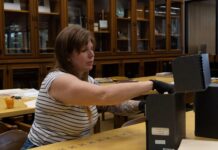What is Gabe Bethke listening to? For the senior American Studies major, there’s no short answer. He jumps from ‘80s thrash metal to EDM, Young Thug to Russian composer Igor Stravinsky. Bethke’s diverse musical tastes are largely hidden by his modest disposition — he’s not one to boast or even give himself credit where it really is due. The only way to truly grasp his musical palette, then, is to listen. As “Icetep,” a producer and beatmaker on the rise, Bethke translates a wide array of influences into his own sound.
Despite the prominence of electronic influences, Bethke’s musical career is rooted in his acoustic training. As a young pianist, he heard his father and uncle play in jazz ensembles around his hometown of Minneapolis. Bethke traded in his classical training for his family’s style in order to join them onstage. However, his stint as a jazz performer was short-lived.
“I didn’t like it that much,” Bethke said. “I just felt antiquated. So when I was 13, I got myself a MIDI keyboard. I started in Garageband, making drum breaks and putting them in songs. I had no idea what I was doing.”
Bethke recalls his introduction to instrumental hip-hop as a pivotal moment in the development of his creative direction and career. A friend suggested he check out Paper Tiger, a producer, DJ and founding member of Minneapolis’s Doomtree collective. The style immediately gripped Bethke, leading him to the likes of J Dilla, Madlib and other boom bap beatmakers. He bought more production programs and MIDI controllers, which are connectable computer instruments like drum pads, keyboards or samplers. But Bethke’s most significant investment in his craft was his time — a commitment to sit down and learn how to make music.
“I just sucked,” Bethke said. “But I kept making beats. Probably from when I was 15 to the first time I really started making beats, I probably made like 400 or 500 just terrible, terrible things. I still have them all in a folder and look at them once in awhile.”
Other than a summer internship at The Sound Gallery, a recording studio in Minneapolis, Bethke’s production education has primarily derived from practice and the internet. Since high school, he has made a point of reading music forums or watching a couple YouTube tutorials every day. These resources are indispensable to aspiring producers and beat-builders, for they feature techniques on what Bethke calls “studio tricks,” or ways to manipulate samples in a library.
His production chops have not only developed through independent practice, but also while working alongside other musicians. Bethke is one half of KILLSTREAK, a rap-producing duo he formed back home in Minneapolis with Tony Williams, known as Tony the Scribe. In 2013, they released their first album, “Janus,” with Williams rapping over tracks produced by Bethke. The album was largely recorded in Occidental’s very own RAW Records studio when Voss visited for a week from Santa Clara University. Soraya Sebghati (senior) is featured as a vocalist on the fifth track, “Testament,” while Hotel Garuda’s Aseem Mangaokar ‘15 shot the cover art.
“The week before I went down there, we had a bunch of loose songs hanging out and didn’t know how they were going to come together,” Williams said. “We just had this idea that I was gonna go down to record all of them and see how they could sequence into an album. Prior to that, we had both released projects on our own but never really had gone through the whole process of promo and release and physical copies.”
As a first attempt, “Janus” succeeded in bringing both Bethke and Williams some recognition in Minneapolis’s hip-hop scene. A Pitchfork article titled “Minnesota Weird: The Best MN Hip-Hop Releases of 2014” by Paul Thompson refers to Bethke as “one of the Cities’ best beatsmiths.” The record also caught the attention of Doomtree’s Andrew Sims, better known as Sims. He then reached out to Bethke to create beats for his EP, “Field Notes.”
Sims cites attributes beyond musicality, particularly Bethke’s sensibility, as the characteristics that most distinguish him as a producer and collaborator.
“His thoughtfulness is his key to what he’s doing,” Sims said. “Everybody’s talented to a certain extent, but I think what sets him apart from other people is his attentiveness to what’s happening in the world around him and how he interprets that and measures his way through it.”
Bethke’s post-graduation plans are not fully, or even partially, developed. Making music is a priority, though it’s unclear where that interest will fall among prospects of graduate school or a full-time job. For now, a degree of separation still exists between Bethke, a college student with his senior comprehensive project on the horizon, and Icetep, an emerging producer.
However, that gap is inching toward a close. He continues to work with Williams and Sims and expects to hear three of his beats on an upcoming album from alt-rapper Astronautalis. Bethke doesn’t have a manager, and he doesn’t have an agent. But he does have a folder with hundreds of scrapped beats and Garageband tracks from his adolescence. With that, he can hear where he started, and at the very least, be glad to have come this far.
Correction: A previous version of this article incorrectly identified Tony Williams as Tony Voss.
![]()



































So dang proud of you! Keep following your passions, along with being a good person!
Namaste,
Coach Soozie (Conor’s Mom)?